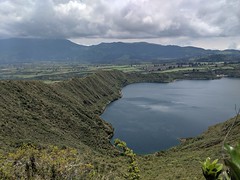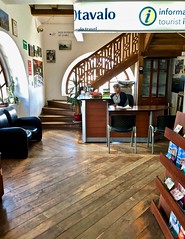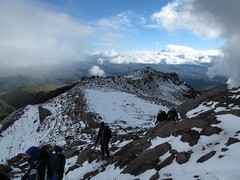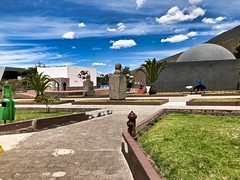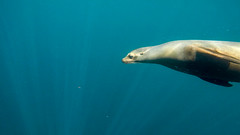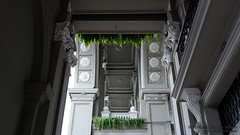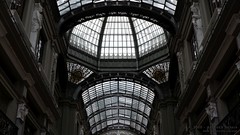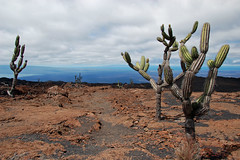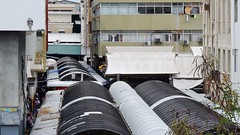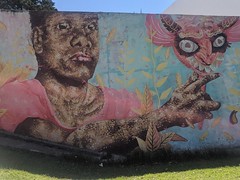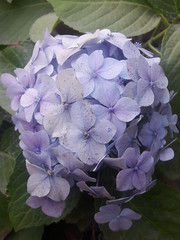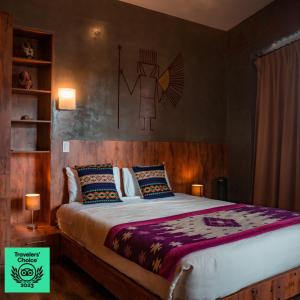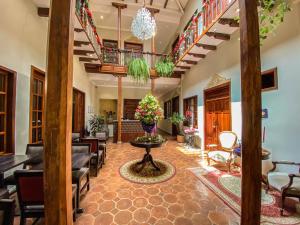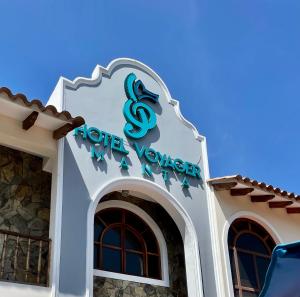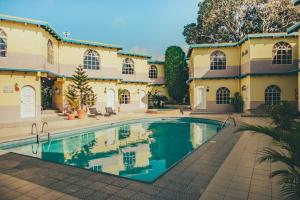 Ecuador
Ecuador
Ecuador (English: /ˈɛkwəd/ ; Spanish: [ekwaˈðoɾ]; Quechua: Ikwayur; Shuar: Ecuador or Ekuatur), officially the Republic of Ecuador (Spanish: República del Ecuador, which literally translates as "Republic of the Equator"; Quechua: Ikwadur Ripuwlika; Shuar: Ekuatur Nunka), is a country in northwestern South America, bordered by Colombia on the north, Peru on the east and south, and the Pacific Ocean on the west. Ecuador also includes the Galápagos Islands in the Pacific, about west of the mainland. The country's capital and largest city is Quito.
The territories of modern-day Ecuador were once home to a variety of Indigenous groups that were gradually incorporated into the Inca Empire during the 15th century. The territory was colonized by Spain during the 16th century, achieving independence in 1820 as part of Gran Colombia, from which it emerged as its own sovereign state in 1830. The legacy of both empires is reflected in Ecuador's ethnically diverse population, with most of its million people being mestizos, followed by large minorities of Europeans, Native American, African, and Asian descendants. Spanish is the official language and is spoken by a majority of the population, though 13 Native languages are also recognized, including Quechua and Shuar.
The sovereign state of Ecuador is a representative democratic republic and a developing country whose economy is highly dependent on exports of commodities, namely petroleum and agricultural products. It is governed as a democratic presidential republic. The country is a founding member of the United Nations, Organization of American States, Mercosur, PROSUR, and the Non-Aligned Movement.
One of 17 megadiverse countries in the world, Ecuador hosts many endemic plants and animals, such as those of the Galápagos Islands. In recognition of its unique ecological heritage, the new constitution of 2008 is the first in the world to recognize legally enforceable Rights of Nature, or ecosystem rights.
According to the Center for Economic and Policy Research, between 2006 and 2016, poverty decreased from 36.7% to 22.5% and annual per capita GDP growth was 1.5 percent (as compared to 0.6 percent over the prior two decades). At the same time, the country's Gini index of economic inequality decreased from 0.55 to 0.47.
Etymology
The country's name means "Equator" in Spanish, truncated from the Spanish official name, República del Ecuador ("Republic of the Equator"), derived from the former Ecuador Department of Gran Colombia established in 1824 as a division of the former territory of the Royal Audience of Quito. Quito, which remained the capital of the department and republic, is located only about , of a degree, south of the equator.
History
Pre-Inca era
Various peoples had settled in the area of future Ecuador before the arrival of the Incas. The archeological evidence suggests that the Paleo-Indians' first dispersal into the Americas occurred near the end of the last glacial period, around 16,500–13,000 years ago. The first people who reached Ecuador may have journeyed by land from North and Central America or by boat down the Pacific Ocean coastline.
Even though their languages were unrelated, these groups developed similar groups of cultures, each based in different environments. The people of the coast combined agriculture with fishing, hunting, and gathering; the people of the highland Andes developed a sedentary agricultural way of life; and peoples of the Amazon basin relied on hunting and gathering, in some cases combined with agriculture and arboriculture.
Over time these groups began to interact and intermingle with each other so that groups of families in one area became one community or tribe, with a similar language and culture. Many civilizations arose in Ecuador, such as the Valdivia Culture and Machalilla Culture on the coast, the Quitus (near present-day Quito), and the Cañari (near present-day Cuenca). Each civilization developed its own distinctive architecture, pottery, and religious interests.
In the highland Andes mountains, where life was more sedentary, groups of tribes cooperated and formed villages; thus the first nations based on agricultural resources and the domestication of animals formed. Eventually, through wars and marriage alliances of their leaders, groups of nations formed confederations. The region around the country's modern capital, Quito, consolidated under a confederation called the Shyris, which exercised organized trading and bartering between the different regions.
Inca era
When the Incas arrived, they found that these confederations were so developed that it took the Incas two generations of rulers—Topa Inca Yupanqui and Huayna Capac—to absorb them into the Inca Empire. People belonging to the confederations that gave them the most problems were deported to distant areas of Peru, Bolivia, and north Argentina. Similarly, a number of loyal Inca subjects from Peru and Bolivia were brought to Ecuador to prevent rebellion. Thus, the region of highland Ecuador became part of the Inca Empire in 1463 sharing the same language.
In contrast, when the Incas made incursions into coastal Ecuador and the eastern Amazon jungles of Ecuador, they found both the environment and indigenous people more hostile. Moreover, when the Incas tried to subdue them, these indigenous people withdrew to the interior and resorted to guerrilla tactics. As a result, Inca expansion into the Amazon Basin and the Pacific coast of Ecuador was hampered. The indigenous people of the Amazon jungle and coastal Ecuador remained relatively autonomous until the Spanish soldiers and missionaries arrived in force. The Amazonian people and the Cayapas of Coastal Ecuador were the only groups to resist both Inca and Spanish domination, maintaining their languages and cultures well into the 21st century.
Before the arrival of the Spaniards, the Inca Empire was involved in a civil war. The untimely death of both the heir Ninan Cuchi and the Emperor Huayna Capac, from a European disease that spread into Ecuador, created a power vacuum between two factions. The northern faction headed by Atahualpa claimed that Huayna Capac gave a verbal decree before his death about how the empire should be divided. He gave the territories pertaining to present-day Ecuador and northern Peru to his favorite son Atahualpa, who was to rule from Quito; and he gave the rest to Huáscar, who was to rule from Cuzco. He willed that his heart be buried in Quito, his favorite city, and the rest of his body be buried with his ancestors in Cuzco.
Huáscar did not recognize his father's will, since it did not follow Inca traditions of naming an Inca through the priests. Huáscar ordered Atahualpa to attend their father's burial in Cuzco and pay homage to him as the new Inca ruler. Atahualpa, with a large number of his father's veteran soldiers, decided to ignore Huáscar, and a civil war ensued. A number of bloody battles took place until finally Huáscar was captured. Atahualpa marched south to Cuzco and massacred the royal family associated with his brother.
In 1532, a small band of Spaniards headed by Francisco Pizarro landed in Tumbez and marched over the Andes Mountains until they reached Cajamarca, where the new Inca Atahualpa was to hold an interview with them. Valverde, the priest, tried to convince Atahualpa that he should join the Catholic Church and declare himself a vassal of Spain. This infuriated Atahualpa so much that he threw the Bible to the ground. At this point the enraged Spaniards, with orders from Valverde, attacked and massacred unarmed escorts of the Inca and captured Atahualpa. Pizarro promised to release Atahualpa if he made good his promise of filling a room full of gold. But, after a mock trial, the Spaniards executed Atahualpa by strangulation.
Spanish colonization
New infectious diseases such as smallpox, endemic to the Europeans, caused high fatalities among the Amerindian population during the first decades of Spanish rule, as they had no immunity. At the same time, the natives were forced into the encomienda labor system for the Spanish. In 1563, Quito became the seat of a real audiencia (administrative district) of Spain and part of the Viceroyalty of Peru and later the Viceroyalty of New Granada.
The 1797 Riobamba earthquake, which caused up to 40,000 casualties, was studied by Alexander von Humboldt, when he visited the area in 1801–1802.
After nearly 300 years of Spanish rule, Quito still remained small with a population of 10,000 people. On 10 August 1809, the city's criollos called for independence from Spain (first among the peoples of Latin America). They were led by Juan Pío Montúfar, Quiroga, Salinas, and Bishop Cuero y Caicedo. Quito's nickname, "Luz de América" ("Light of America"), is based on its leading role in trying to secure an independent, local government. Although the new government lasted no more than two months, it had important repercussions and was an inspiration for the independence movement of the rest of Spanish America. Today, 10 August is celebrated as Independence Day, a national holiday.
Independence
On 9 October 1820, the Department of Guayaquil became the first territory in Ecuador to gain its independence from Spain, and it spawned most of the Ecuadorian coastal provinces, establishing itself as an independent state. Its inhabitants celebrated what is now Ecuador's official Independence Day on 24 May 1822. The rest of Ecuador gained its independence after Antonio José de Sucre defeated the Spanish Royalist forces at the Battle of Pichincha, near Quito. Following the battle, Ecuador joined Simón Bolívar's Republic of Gran Colombia, also including modern-day Colombia, Venezuela, and Panama. In 1830, Ecuador separated from Gran Colombia and became an independent republic. Two years later, it annexed the Galapagos Islands.
The 19th century was marked by instability for Ecuador with a rapid succession of rulers. The first president of Ecuador was the Venezuelan-born Ju…
Hotels Ecuador
Looking for places related to Ecuador?
Those are other destinations to find places related to Ecuador:




